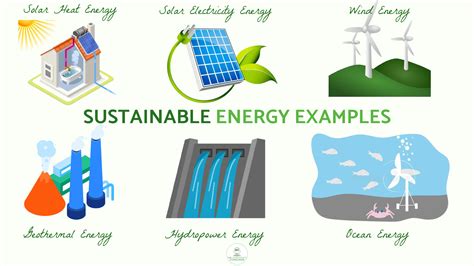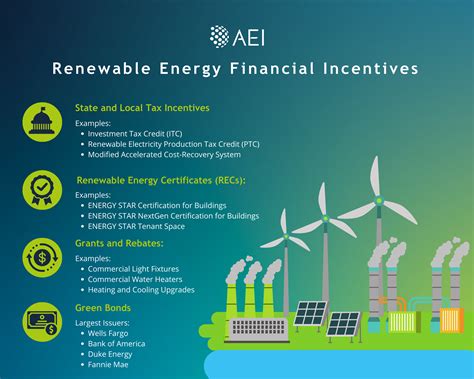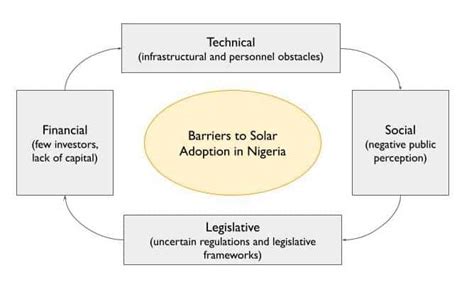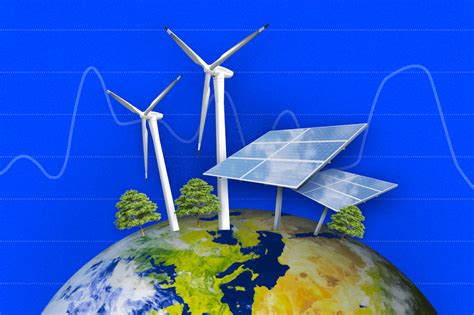Explore the impact of renewable energy on climate change, its benefits for sustainable development, technologies, economic advantages, and future trends for a safer world.As the world grapples with the pressing challenges of climate change and energy insecurity, the transition to renewable energy has never been more crucial. Renewable Energy – Powering a Safer Future explores the transformative potential of sustainable energy sources, illuminating their role in mitigating environmental impacts and fostering economic growth. This article delves into the myriad benefits of renewable energy, highlighting innovations in technology that are reshaping the energy landscape. From enhancing energy security to driving sustainable development, we will unpack the multifaceted advantages that renewable solutions offer. However, the journey towards a greener future is not without its obstacles. Join us as we navigate through the complexities of adoption barriers and gaze into future trends that promise a more resilient world powered by clean energy.
The Impact Of Renewable Energy On Climate Change
The shift towards renewable energy sources plays a pivotal role in mitigating climate change. By transitioning from fossil fuels to sustainable alternatives, we can significantly reduce greenhouse gas emissions, which are the primary contributors to global warming. Renewable energy technologies, such as wind, solar, and hydroelectric power, generate electricity with little to no emissions compared to traditional energy sources.
One of the critical impacts of renewable energy on climate change is its ability to stabilize the atmosphere. According to various studies, increasing the share of renewables in the energy mix can help create a more balanced carbon cycle, thereby contributing to a cooler planet. For instance, solar power installations not only generate clean energy but also require less land area than traditional power plants, protecting natural habitats and reducing ecological destruction.
Moreover, the adoption of renewable energy fosters innovation and encourages more energy-efficient technologies. By harnessing natural resources effectively, nations can reduce their reliance on imported fuels, lower energy costs, and create job opportunities in green sectors. This not only enhances energy security but also promotes economic resilience as countries adapt to a low-carbon future.
The global push towards renewable energy serves as a catalyst for international agreements focusing on climate action. Initiatives such as the Paris Agreement emphasize the importance of transitioning to clean energy to limit global warming to 1.5 degrees Celsius above pre-industrial levels, thereby underscoring the essential role of renewable energy in global climate strategy.
The Benefits Of Renewable Energy For Sustainable Development
The role of renewable energy in promoting sustainable development is significant and multifaceted. By harnessing energy from natural resources such as sunlight, wind, and water, we can create a cleaner and more sustainable future. Below are some key benefits:
- Environmental Protection: Transitioning to renewable energy helps reduce greenhouse gas emissions, thereby combating climate change and protecting ecosystems.
- Economic Growth: Investment in renewable energy technologies stimulates job creation in manufacturing, installation, and maintenance sectors, driving local economic growth.
- Energy Access: Renewable energy sources can provide power to remote and underserved communities, improving energy access and quality of life.
- Resource Diversification: Utilizing a mix of renewable energy sources can reduce dependence on fossil fuels and enhance energy resilience.
- Technological Innovation: The shift towards renewable energy drives innovation in technology, leading to more efficient energy solutions and systems.
Leveraging renewable energy fosters sustainable development through environmental protection, economic opportunities, and improved quality of life while paving the way for future generations to thrive in a safer and more stable environment.
Renewable Energy Technologies Transforming The Energy Landscape
The advent of renewable energy technologies is revolutionizing the way we generate and consume energy. With a growing focus on sustainability and reducing carbon emissions, these technologies are playing a pivotal role in creating a cleaner and more resilient energy infrastructure. Here are some key technologies that are transforming this landscape:
- Solar Energy: Photovoltaic (PV) panels and solar thermal systems harness sunlight to produce electricity and heat. The decline in costs and improvements in efficiency have made solar one of the fastest-growing sources of renewable energy.
- Wind Energy: Onshore and offshore wind farms capture kinetic energy from wind and convert it into electricity. Wind power is now considered one of the most cost-effective sources of renewable energy available.
- Hydropower: Utilizing the flow of water in rivers and dams, hydropower remains one of the oldest and most widely used forms of renewable energy. Advances in turbine technology are increasing its efficiency and capacity.
- Geothermal Energy: This technology taps into the Earth’s internal heat to generate electricity or provide direct heating. Geothermal systems are gaining traction in regions with high geological activity.
- Bioenergy: By converting organic materials into energy, bioenergy can provide power and heat. Innovations in biogas production and biomass energy are expanding its feasibility and application.
- Energy Storage Solutions: Technologies such as batteries and pumped storage systems are crucial for balancing supply and demand. They allow for the storage of renewable energy produced during peak generation times for use during periods of low generation.
These technologies not only reduce dependence on fossil fuels but also enhance energy independence and security, paving the way towards a sustainable future. The continued investment and innovation in renewable energy technologies will be essential to meeting global energy demands while minimizing environmental impact.
How Renewable Energy Can Enhance Energy Security
As countries strive for a robust and resilient energy system, renewable energy plays a crucial role in enhancing energy security. Here are several ways in which renewable energy contributes to a more secure energy future:
- Diverse Energy Sources: By integrating a variety of renewable energy sources such as solar, wind, hydro, and geothermal, nations can reduce their dependence on a single source of energy. This diversification minimizes vulnerabilities associated with energy supply disruptions.
- Local Energy Production: Renewable energy allows for localized power generation, significantly decreasing the need for long-distance energy transportation. This not only reduces transmission losses but also provides communities with energy independence.
- Resilience Against Geopolitical Tensions: Relying on local renewable energy sources reduces a country’s exposure to geopolitical conflicts and market volatility associated with fossil fuels. This stability enhances national energy security.
- Job Creation and Economic Stability: Investing in renewable energy infrastructure leads to job creation and fosters economic growth, which strengthens a nation’s capacity to manage and respond to energy challenges.
- Technological Advancements: Continued investments in renewable energy technologies foster innovation and improve energy efficiency. These advancements can lead to cost reductions, making renewable sources increasingly competitive and bolstering energy security.
Transitioning to renewable energy not only provides a sustainable energy future but also enhances energy security by promoting diversification, local production, economic stability, and resilience against external threats. These benefits are essential for countries looking to secure their energy needs in an uncertain global environment.
The Economic Advantages Of Investing In Renewable Energy
Investing in renewable energy presents a multitude of economic benefits that extend beyond just environmental sustainability. Here are some key advantages:
- Job Creation: The renewable energy sector has proven to be a significant source of employment. From manufacturing to installation and maintenance of solar panels, wind turbines, and other renewable technologies, millions of jobs have been created worldwide.
- Energy Independence: By expanding investments in renewable energy, nations can reduce reliance on imported fossil fuels, which helps bolster national security and stabilize local economies.
- Lower Energy Costs: The continuous advancements in technology and increasing scalability of renewable energy sources often lead to decreased costs for consumers. Over time, as infrastructure improves and economies of scale are realized, the price of energy generated from renewable sources becomes increasingly competitive.
- Attracting Investments: Renewable energy projects often attract investments from both domestic and foreign entities. Governments and businesses see the long-term benefits of investing in sustainable technologies, thus leading to increased capital flow into the sector.
- Economic Resilience: By diversifying energy sources with renewable energy, economies can become more resilient to fluctuations in fossil fuel prices. This stability is crucial for long-term economic health.
- Innovation and Technological Advancements: The push towards renewable energy fosters innovation, encouraging research and development in cutting-edge technologies. This not only results in more efficient energy production but can also lead to breakthroughs that benefit other sectors.
- Environmental Cost Savings: By investing in renewable energy, countries can reduce the economic burden associated with pollution and health issues related to fossil fuel emissions. Transitioning to cleaner sources can lead to significant savings in healthcare and environmental remediation costs.
The economic advantages of investing in renewable energy are substantial. This transition not only supports a greener planet but also fosters economic growth, enhances energy security, and promotes job creation in an evolving marketplace.
Barriers To Adoption Of Renewable Energy Solutions
Despite the undeniable benefits of renewable energy, several barriers impede its widespread adoption. Understanding these challenges is crucial for developing effective strategies to overcome them and accelerate the transition to a more sustainable energy future.
Here are some of the main barriers to the adoption of renewable energy solutions:
- High Initial Costs: The upfront capital required to develop renewable energy projects can be a significant barrier. Technologies such as solar panels, wind turbines, and geothermal systems often require substantial investment, which can deter businesses and consumers from making the switch.
- Lack of Infrastructure: Many regions lack the necessary infrastructure to support renewable energy technologies. This includes inadequate grids, limited storage solutions, and insufficient distribution systems that can lead to reliability issues.
- Regulatory Hurdles: Inconsistent policies and regulations surrounding renewable energy can create uncertainty for investors and developers. Navigating permits, licenses, and compliance can be complicated and time-consuming.
- Market Competition: Conventional energy sources like coal and natural gas often remain cheaper due to existing subsidies and established supply chains. This market competition can make it challenging for renewable energy to gain a foothold.
- Technological Challenges: While renewable energy technologies are advancing rapidly, there are still technical challenges, such as the intermittency of solar and wind power, which can impact reliability and increase the need for backup systems.
- Public Awareness and Perception: A lack of understanding or misinformation about renewable energy technologies contributes to hesitancy among consumers and stakeholders. Educational campaigns are necessary to promote awareness and acceptance.
Addressing these barriers is essential in paving the way for a sustainable energy future. Stakeholders must work collaboratively to develop innovative solutions and create conducive environments for the growth of renewable energy.
Future Trends In Renewable Energy For A Safer World
As the global demand for energy continues to rise, the renewable energy sector is advancing rapidly, driven by technological innovations and public policy initiatives. Here are some significant trends that are shaping the future of renewable energy and contributing to a safer world:
- Energy Storage Solutions: The development of advanced energy storage systems, such as batteries and pumped hydro storage, is crucial for balancing supply and demand. Improved storage technologies allow for the efficient use of renewable sources, even when production is intermittent.
- Smart Grids: The integration of smart grid technologies will enable better management of energy resources. Smart grids can optimize energy distribution and enhance grid reliability, facilitating the widespread adoption of renewable energy.
- Decentralized Energy Systems: The shift towards decentralized energy systems, where energy is produced close to the point of use, is gaining traction. Community solar projects and individual home installations are examples that empower local communities and reduce transmission losses.
- Innovation in Renewable Technologies: Ongoing research and development in renewable technologies, such as floating solar panels and enhanced geothermal systems, promise to unlock new potential for sustainable energy generation.
- Policy and Regulatory Support: Governments worldwide are increasingly implementing supportive policies that encourage the transition to renewable energy. Incentives, subsidies, and regulatory frameworks are fostering investments in clean energy solutions.
- Carbon-neutral Initiatives: Many corporations are committing to carbon neutrality, prompting a surge in the deployment of renewable energy solutions. This trend is crucial for addressing climate change and promoting a greener economy.
- Hydrogen Economy: Green hydrogen, produced using renewable energy, is set to play a key role in decarbonizing industries that are hard to electrify. This emerging sector is expected to reduce reliance on fossil fuels significantly.
These trends signify a transformative movement towards a sustainable, resilient, and secure energy future. By embracing these changes, we can ensure that renewable energy not only meets our current energy needs but also paves the way for generations to come.
Frequently Asked Questions
Renewable energy refers to energy sources that are naturally replenished, such as solar, wind, hydroelectric, and geothermal energy.Renewable energy is crucial for reducing greenhouse gas emissions, combating climate change, and ensuring a sustainable energy supply for future generations.By reducing reliance on fossil fuels, renewable energy decreases air and water pollution, leading to improved public health and a safer environment.The most common types include solar energy, wind energy, hydroelectric power, biomass, and geothermal energy.Renewable energy can create jobs, reduce energy costs over time, and promote energy independence by utilizing local resources.Individuals can contribute by using energy-efficient appliances, installing solar panels, supporting clean energy initiatives, and reducing overall energy consumption.Challenges include technological advancements, infrastructure development, regulatory policies, and the need for investment to scale renewable energy solutions.











